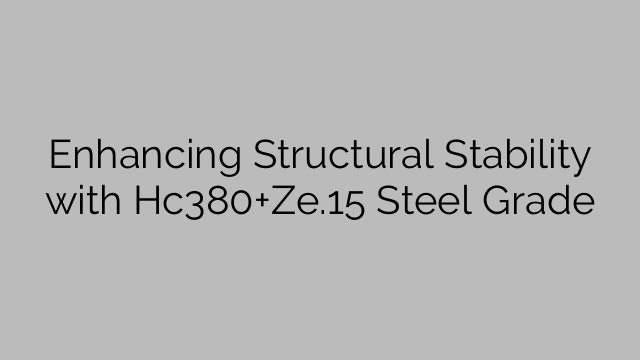Structural stability is essential in construction and engineering, as it ensures that buildings, bridges, and other structures can withstand the forces and loads they are subjected to. To achieve this, the choice of materials used in construction plays a crucial role. One of the steel grades that has gained prominence in the industry for enhancing structural stability is Hc380+Ze.15.
Hc380+Ze.15 is a high-strength, low-alloy steel grade that is specifically designed to provide excellent mechanical properties and enhanced structural stability. It is known for its high yield strength, which means it can withstand significant loads without undergoing plastic deformation. This makes it an ideal choice for applications where structural stability is of utmost importance.
One of the key factors that contribute to the enhanced structural stability of Hc380+Ze.15 steel grade is its high tensile strength. Tensile strength refers to the maximum amount of tensile stress a material can withstand before failure. With a higher tensile strength compared to conventional steel grades, Hc380+Ze.15 can provide greater resistance to external forces, making it ideal for use in high-stress applications.
In addition to its high tensile strength, Hc380+Ze.15 steel grade also offers good impact resistance, which is crucial for structures that are susceptible to dynamic loads such as seismic events or heavy machinery vibrations. This property ensures that the material can withstand sudden and high-impact forces without failing, thereby enhancing the overall structural stability of the construction.
Furthermore, Hc380+Ze.15 steel grade exhibits excellent weldability and formability, which allows for ease of fabrication and construction. This makes it a popular choice for engineers and designers who are looking to create structurally stable yet complex structures.
The corrosion resistance of Hc380+Ze.15 steel grade is another key factor that contributes to its suitability for enhancing structural stability. Corrosion can weaken the structural integrity of a building or bridge over time, and using a material that is resistant to corrosion can significantly prolong the lifespan of the structure.
Overall, Hc380+Ze.15 steel grade offers a combination of high tensile strength, impact resistance, formability, weldability, and corrosion resistance, making it an ideal choice for applications where structural stability is paramount. It is widely used in the construction of buildings, bridges, offshore platforms, and other critical infrastructure projects.
In conclusion, the use of Hc380+Ze.15 steel grade has proven to be instrumental in enhancing structural stability in construction and engineering. Its unique combination of mechanical properties and resistance to external forces makes it a reliable choice for ensuring the safety and longevity of various structures. As the demand for stronger and more durable structures grows, Hc380+Ze.15 steel grade will continue to play a vital role in meeting these requirements.

